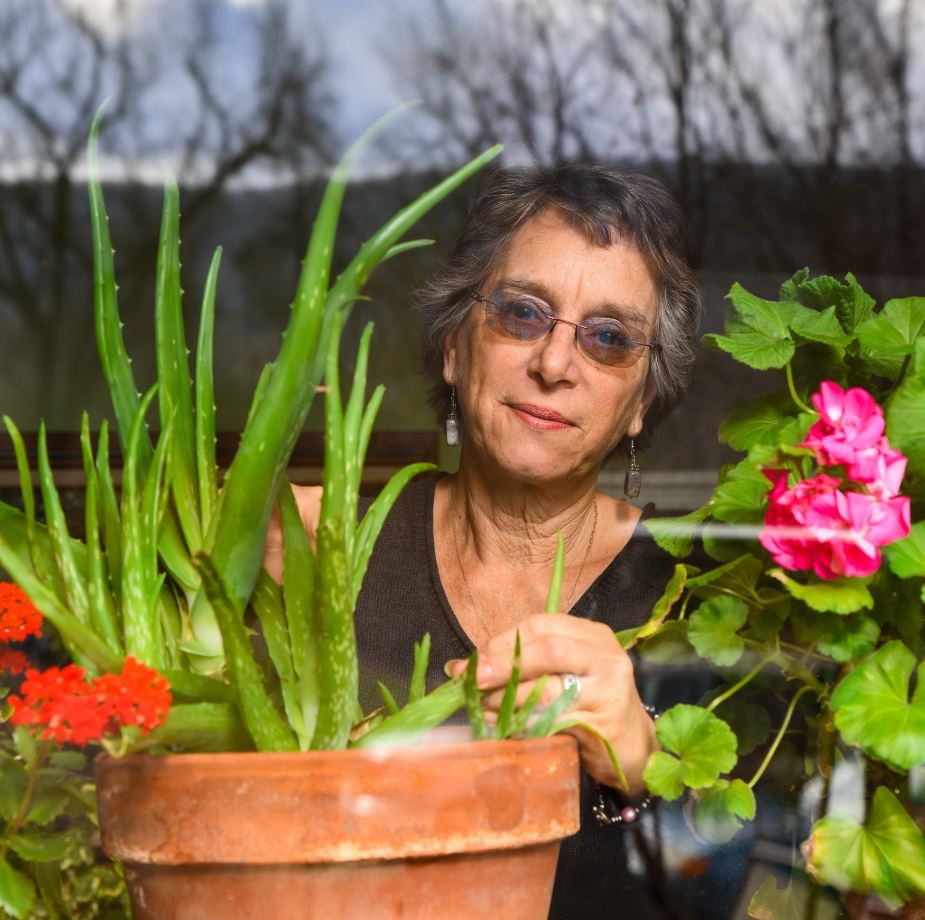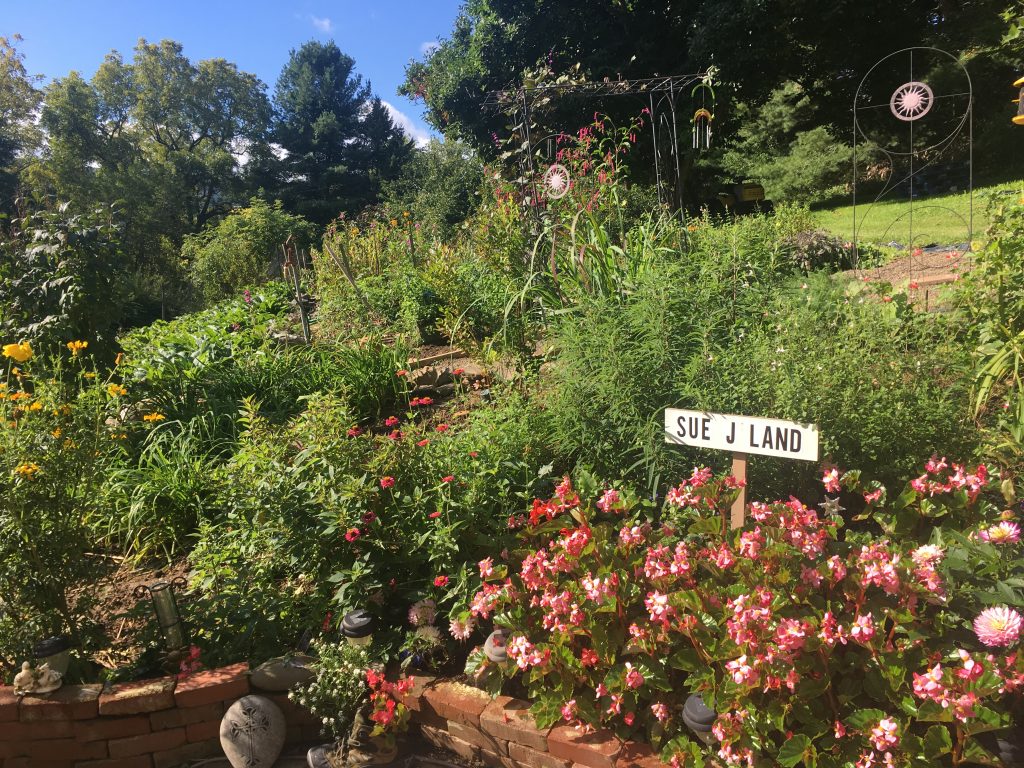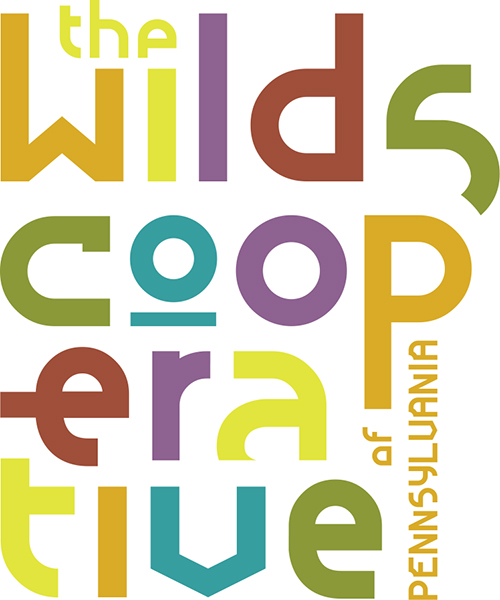Growing a Medicinal Garden in the Pennsylvania Wilds
By Sue J Morris
We think of gardens as places where wonderful things grow: flowers, vegetables, fruits, shrubs, trees and herbs. Gardens are grown for beauty, for food and nutrition, to create sacred spaces, and for their wide-ranging benefits for the body and soul.
Gardeners are hopeful. Gardeners believe in the future. Why else plant a seed if not for the anticipation of the plant? Gardeners believe in life!
Here in The Pennsylvania Wilds there are countless gardens growing in people’s backyards, but many people underestimate the medicinal value of what they are growing. My mission is to inspire everyone to see their gardens as home pharmacies.

I believe that the garden is a place to grow natural medicines. By growing medicinal plants, we can grow our own herbal remedies which have countless health benefits.
Growing fruits and veggies provides us with powerful nutrition. This is the most fundamental need we all have for health and survival. Poor nutrition is the root cause of all illness.
Did you know that herbs used in food, thought of as culinary herbs, and herbs used for medicine are the very same plants? They offer delicious flavors with their aromatic properties but are also deeply nourishing and can be used for healing a multitude of ailments. It is precisely the aromatic compounds in herbs which give food such intense flavor and also offer powerful health benefits. These aromatic compounds are rich in essential oils, the “essence” of the plant. Aromatic culinary herbs (such as basil, thyme, oregano and so on) can enhance the immune system, regulate digestion, and stimulate the appetite, in addition to being extremely rich in anti-oxidants, which detoxify the system.
Growing plants to provide simple and effective medicine is something we can all do, whether it is simply on a sunny windowsill, in pots outdoors or in healing medicine gardens. We each do what we can with the space we have valuable. Herbs are very easy to grow and require no special soil. Give them sun, good drainage and love and you’re good to go!

The most common culinary herbs we are all familiar with have tremendous health benefits.
The most easily and commonly grown culinary herbs in The Pennsylvania Wilds are basil, mint, rosemary, lavender, oregano and thyme. Not only are they delicious and easy to grow but they each offer tremendous benefits for our health. There are countless others but if you just had these herbs growing you can protect yourself from a host of chronic, degenerative diseases.
Pennsylvania’s 2017 Health Ranking, according to America’s Health Ranking annual report, comes in at 28th on the list, a low ranking for our state’s physical, mental and social well-being. I believe our health can be greatly improved by the use of herbs as sources of nutrition and natural remedies, for body, mind and spirit.
Peppermint contains anti-microbial essential oils which stop the growth of many bacteria and inhibits the growth of fungus. Peppermint contains rosmarinic acid which is beneficial for asthma. It is widely known as a digestive aid (think of after-dinner mints) and it relieves symptoms of irritable bowel syndrome, indigestion and muscle spasms. Just drinking a cup of fresh peppermint tea daily has a multitude of health benefits. Mint is an easy-to-grow perennial. It returns years after year providing us with medicine. Just be careful where you plant it because it spreads like crazy and its runners can grow the length of your garden in no time.
Tulsi or Holy Basil, probably the most revered of all plants in India, also grows well in the Pennsylvania Wilds. Its benefits are widely known for many ailments, most notably for treating the digestive and respiratory systems, but Tulsi also benefits us by lowering stress; normalizing blood sugar levels; protecting us from infections, especially in the lungs; and treating kidney stones, headaches, constipation, flatulence and GERD most effectively. No garden should be without a Tulsi plant. In India it is grown in front of every home, enshrined as a Goddess, revered for its health and spiritual benefits
Lavender has a multitude of benefits. It is used to treat nervous disorders such as insomnia, sleep disorders, mental fatigue, nervousness, irritability and depression. For the immune system it is antibacterial and anti-fungal. Topically, it promotes wound healing and heals burns and inflammations. Drink lavender tea before bed, steep lavender in oil for healing burns, or use lavender in salve for healing skin tissue. Just walking by your lavender plants will be uplifting to the spirit and calm your nerves.
Comfrey, a lesser-known herb, is on the top of my list for healing topical skin problems such as bruises, muscular aches and pains, and inflammation, especially black and blues. I use comfrey in all of my salves and have always been amazed at the testimonials I get for the healing power of Sue’s Salves on chronic skin ailments. It is a hardy perennial with lovely purple flowers and both the leaf and root have tremendous healing properties.
Rosemary is a plant rich in antioxidants which preserve food and preventing food poisoning. Rosemary’s powerful essential oils help regulate digestion and are used as a tea infusion to help with gas, bloating and indigestion. Rosemary is a stimulating nerve tonic and is useful for headaches, insomnia and fighting infections. Best of all, rosemary aids memory and cognitive function, simply meaning it helps the brain! Drink rosemary tea, use it in cooking and keep it nearby as a natural insect repellent.
I will close with a quote from the father of medicine, Hippocrates: “The only true science of medicine is the intelligent use of nature’s only real medicinal remedies-herbs”.
Go Pennsylvania wild and consider growing your own medicinal herbs!
About the Author: Sue J Morris, owner and sole artisan behind Sue’s Salves, is a professional Artisan member of the Wilds Cooperative of Pennsylvania. Sue produces herbal skincare and aromatherapy products and offers herbal retreats at her historic home located along the I-80 Frontier of Pennsylvania Wilds. Sue has been a featured speaker at many notable events, including Mother Earth News and the Philadelphia Museum of Art, in addition to having her literary works published in books and magazines.
One of rural Pennsylvania’s largest networks of creative entrepreneurs, the Wilds Cooperative of Pennsylvania (WCO) is the main program through which small businesses and nonprofits – from artisans to breweries to B&Bs to outfitters to retailers to restaurants to galleries to designers to videographers – engage with the Pennsylvania Wilds brand, networks and platforms. Visit WildsCoPa.org to learn more.




Thank you for all your efforts. I am an herbalist and with my small backyard I grow, use and share my herbs with others. Blessings,
Annie